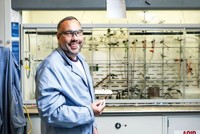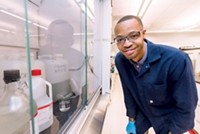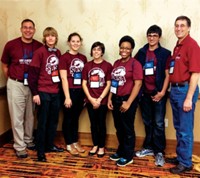Advertisement
Grab your lab coat. Let's get started
Welcome!
Welcome!
Create an account below to get 6 C&EN articles per month, receive newsletters and more - all free.
It seems this is your first time logging in online. Please enter the following information to continue.
As an ACS member you automatically get access to this site. All we need is few more details to create your reading experience.
Not you? Sign in with a different account.
Not you? Sign in with a different account.
ERROR 1
ERROR 1
ERROR 2
ERROR 2
ERROR 2
ERROR 2
ERROR 2
Password and Confirm password must match.
If you have an ACS member number, please enter it here so we can link this account to your membership. (optional)
ERROR 2
ACS values your privacy. By submitting your information, you are gaining access to C&EN and subscribing to our weekly newsletter. We use the information you provide to make your reading experience better, and we will never sell your data to third party members.
Careers
Steven Lopez
High school and undergrad mentors help a budding physical organic chemist get into UCLA's Ph.D. program
by Marc S. Reisch
May 31, 2010
| A version of this story appeared in
Volume 88, Issue 22
From the time he was in high school in Weston, Fla., near Fort Lauderdale, Steven Lopez knew he liked science. It just took him a while to realize it was physical organic chemistry that he liked most of all.
The 22-year-old ACS Scholar has just completed his bachelor’s degree in chemistry at New York University (NYU) and will be heading off to the University of California, Los Angeles, in the fall to pursue a Ph.D. under the tutelage of Kendall N. Houk.
Lopez had other prospects, having been accepted to UC San Diego; UC Santa Barbara; the University of Texas, Austin; and the University of Chicago. However, Lopez says, he was particularly eager to work with Houk, a well-known organic chemist.
A bright student, Lopez felt drawn to the sciences early on. During his career at Cypress Bay High School, he took advanced classes in physics, calculus, biology, and chemistry. “I didn’t like physics, but I was interested in biology and chemistry,” he says.
And initially, he thought he wanted to be a neurologist, a career that would have combined his interest in both biology and chemistry. But most of all, he says, he was particularly interested in the “molecular end of neurology” because he was interested in how nerve signals travel to move muscles.
Lopez credits his high school chemistry teacher, Clara Russo, for helping to push him in the direction of chemistry. Russo chairs the science department at Cypress Bay High. She remembers Lopez as “a very enthusiastic learner who thought outside the box.” She adds, “He asked more questions than most of the other students. You tend to remember students like that.”
So interested was Lopez in the sciences during his high school years that he formed a science club with other members of his class. Russo acted as the faculty adviser.
Russo says she and Lopez also shared a bond. Like him, she had a Cuban background and spent her early childhood years in the New York City area, where there is a vibrant Cuban community.
Lopez was born in New Jersey and moved to Florida with his Cuban-born parents when he was six years old. His mother is a fifth-grade schoolteacher, and his father is a real-estate agent.
A graduate of the City University of New York’s Hunter College, Russo encouraged Lopez to go to the Big Apple for his college education as well, because of the rich educational opportunities available there, she says.
She also knew that Lopez “dearly loved his grandfather” and grandmother, she says. They still live across the Hudson River from New York City, in Union City, N.J. Russo thought Lopez would benefit from living near relatives who care deeply for him. But now that he is leaving Manhattan, “they are not happy that I will be away at graduate school in California,” Lopez confesses.
When Lopez was a freshman at NYU, he thought he’d focus on biology. He spent the summer after his freshman year working in a biology lab “and hated it,” he says. But he really liked an organic chemistry class he took with Maitland Jones Jr.
In May 2008, Lopez began working in James W. Canary’s chemistry lab at NYU to advance his research skills. Canary tells C&EN that Lopez “is a very enthusiastic and engaging student.” Lopez has worked on a number of projects, including one to develop chemosensors for mercury. “Steven’s love for organic chemistry coupled with theory is an excellent combination for a career in physical organic chemistry,” Canary says.
The NYU professor places Lopez in the top 20% of undergraduates that he’s had in the lab over the years. “He is competitive with students that were accepted to and have done well at graduate programs at Princeton and Johns Hopkins Universities,” Canary says. But he expects Lopez “to blossom” during graduate school work, where finances will be less of a concern for him.
As a grad student, Lopez will be receiving a stipend, which will relieve much of the financial burden on him now. “I owe a good amount on loans” to pay for schooling at NYU, he says. A scholarship from NYU has helped, as well as money he receives through the ACS Scholars Program, which provides up to $5,000 annually to aid underrepresented minority students pursuing a degree in the chemical sciences.
The Société de Chimie Industrielle, a New York City-based chemical industry education group, helps support Lopez through the ACS Scholars Program. Other organizations, such as the PPG Industries Foundation and the Camille & Henry Dreyfus Foundation, also contribute to the program. Funding from the ACS Scholars Program is “survival money,” Lopez says.
In addition to scholarships and his parents’ financial support, Lopez has also taken on jobs tutoring fellow chemistry students to “pick up a few extra dollars.”
For now, Lopez’ tutoring days are behind him. Eventually, he hopes to get a postdoctoral position and continue on to a career in academia. He is “excited to start graduate school in the fall” at UCLA, he says, and is happy with the prospect of “doing research all day.
Help support an ACS Scholar. Please make a gift online or contact Kathy Fleming in the ACS Development Office for more information on contributing to this important program. She may be reached at (800) 227-5558, ext. 6210, or by e-mail at k_fleming@acs.org.







Join the conversation
Contact the reporter
Submit a Letter to the Editor for publication
Engage with us on Twitter